Chris Cloney of GradBlogger Talks Turning his Blog into a Business
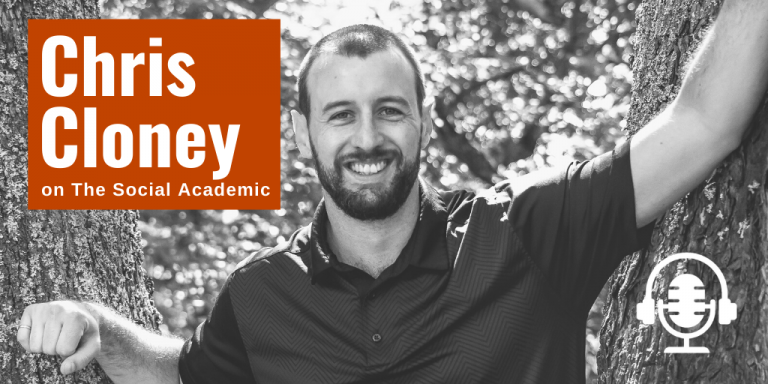
Are you interested in blogging? Meet Chris Cloney, PhD of the GradBlogger Podcast
Are you a grad student or PhD thinking about blogging? Have you ever considered starting your own business based on your expertise?
I’m excited to introduce you to my next guest on The Social Academic. I’m Jennifer van Alstyne and welcome to my blog where I share articles and interviews about managing your online presence in the academy.
Subscribe to The Social Academic blog.
The form above subscribes you to new posts published on The Social Academic blog.
Want emails from Jennifer about building your online presence? Subscribe to her email list.
Looking for the podcast? Subscribe on Spotify.
Prefer to watch videos? Subscribe on YouTube.
Meet Chris
Subscribe to the podcast on Spotify | YouTube | TuneIn | ListenNotes | Blubrry
Today I’m talking with Chris Cloney, PhD of Dust Safety Science, and the GradBlogger podcast. Chris started blogging about his dust safety research, monetized it, and now it’s an independent research company working with people around the world.
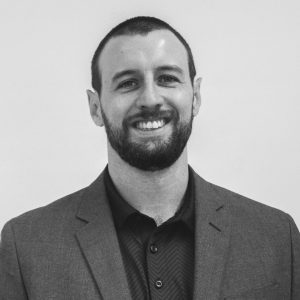
He joins me to talk about
- how he got started blogging about his research
- his journey growing the business
- the GradBlogger podcast
- advice for getting started
Then, he answers your questions about blogging, questions from readers like you:
- How much content do you need to start a blog?
- How researched should my blog posts be?
- How many blog readers can I get?
- What shouldn’t I write about? (Should I ask my supervisor?)
- Can I write about different topics on a blog?
It’s all in this interview on The Social Academic.
This podcast interview was recorded in early May 2020.
Meet Chris Cloney
Jennifer: So we are now recording.
Just to get us started, would you please introduce yourself?
Chris: Sure. So, I’m Chris Cloney. I have an undergraduate degree in Mechanical Engineering in 2011. And I finished my PhD in Chemical Engineering in 2018.
And my academic research was around the physics and chemistry of explosions specifically related to industrial safety.
- why they happen
- how they happen
- how to prevent them
I have two main websites online, DustSafetyScience.com and GradBlogger.com. And I’m gonna jump into my story and any one of those that you want as we go.
What is dust safety science all about?

Jennifer: Yeah. I’m really curious about dust safety science.
You started a blog about dust safety during grad school, DustSafetyScience.com, that’s now become an independent research company. Which is amazing.
So first I want to ask, what is dust safety science, and why is it so important?
Chris: Sure. So when people think of industrial safety, and explosions, if they think about it which probably isn’t that often…
But when they do, they probably think about a gas explosion. So you have a release of a flameable vapor. It is allowed to collect in some area, and it’s confined. And when it’s ignited it can lead to an explosion.
My research work was in similar things. Except instead of having a gas, it’s a flammable or combustible dust.
So if you think of your shiny Macbook Pro sitting on your desk, a really high-polish aluminum…When they’re doing that in an industrial setting it generates a lot, a lot. Like tons, and tons, and tons of aluminum dust, a really fine powder.
And that’s just as reactive as gasoline. Especially if it gets thrown up into the air, an explosion can happen if it’s ignited.
So these are less frequent in industry, which is actually sort of a bad thing. Because when they happen, they’re pretty severe. So people don’t see them as often. They don’t see them as much. There’s not as much understood of how they happen.
So that’s where my research work came in, my academic research. Dust Safety Science originally started as a blog that was MyDustExplosionResearch.com which is like the worst name ever,
So we’ll probably get into this later, but if you’re going to get started and you’re worried about your name, just pick a name. You can always change it later to something else.
Jennifer: I like that, good tip.
Chris: That’s what I’ve built out of that.
Our mission there is to see a year of zero fatalities worldwide from these type of industrial accidents by 2038. We generate a lot of programs and projects to try and make that happen online.
Subscribe to The Social Academic blog.
The form above subscribes you to new posts published on The Social Academic blog.
Want emails from Jennifer about building your online presence? Subscribe to her email list.
Looking for the podcast? Subscribe on Spotify.
Prefer to watch videos? Subscribe on YouTube.
I’m going to ask about money

Jennifer: Now monetizing the blog, turning it into a research company. That took a couple of years. What was that process like?
Chris: So the first 12 months or so was really content-driven. I was just blogging, writing articles. I didn’t start my podcast back then. I started a weekly newsletter. I started writing reports as lead magnets to get people on my newsletter.
It was really this phase of making connections and networking, getting to know people.
In September 2017, so I’d been at it about a year, I started thinking, is this something I can actually monetize as a blog?
Remember, I was into entrepreneurship. I tried to start these money blogs. I gave up and was just like I’m gonna get some skills online and just write about my research.
About a year in, I really thought, there’s something here. So I set a goal to make a couple hundred dollars a month, and to try to figure out how to do that.
I had a couple ideas. I tried affiliate textbook sales, and you know the normal stuff most of us academic bloggers start with, and none of it really worked.
So I went back to the drawing board. I did some research and looked at my industry and said, what do people actually pay for in my industry now? And it happened to be I was looking at a media company’s website that does magazines and online publishing and there’s all these advertisers there.
It’s like, okay well this site has so much traffic, probably an order of magnitude or even more higher than mine. But I know there’s advertisers on there. I set this goal of $200/month.
I emailed a company and said, hey I have a newsletter. I knew they were on the newsletter so we interacted back and forth. I said, would you pay $200/mo. to put your logo at the bottom of the newsletter, like a small banner ad?
They first emailed me back and said, “Yeah, sure. We’ll do it. Just contact our marketing manager and go through it.”
I forgot to put in the email that it has a cost associated with it. So I wrote them back and said, “Well there’s a price and you have to the website to see the price.”
He’s a good friend of mine now, we’ve grown together over the years. But he said, “Of course there is. Just email my marketing manager and we’ll organize it.”
The marketing manager emailed me back and said, “Yeah, we’ll take a year.”
Jennifer: That’s amazing. And that was your first attempt at kind of trying to figure out advertising, is that correct?
Chris: Yeah. It was one email. And it would have been a $2,400 sale. But I said no, it’s obviously priced too low. So I gave them 3 months and then we started upping the newsletter advertising from there. And going a couple of different routes.
That was the $1, $10, and couple hundred dollars I made online, from a small newsletter ad on a small newsletter. It had just 250 people on it.
Jennifer: And what I like about what you’re saying is that it took trial and error. It took looking at other things that you’d heard of, that you’d been researching to figure out what was actually going to work for your industry, and for the people reading your newsletter, and reading your website.
Chris: Yeah, 100% I agree.
Working from home but helping around the world
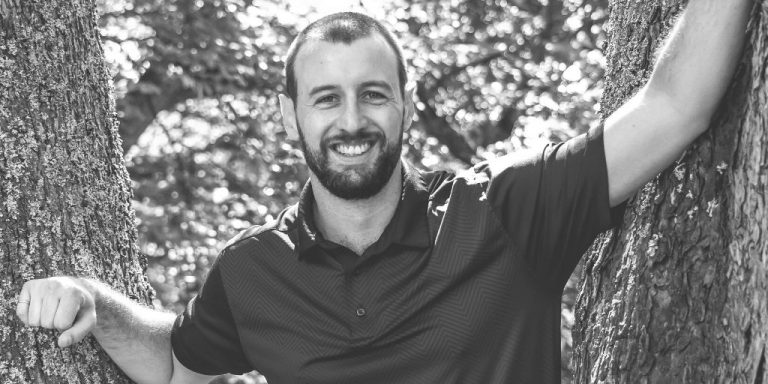
Jennifer: So I asked why you started blogging. And now that the blog is a business, and makes money of course I understand the financial motivation from it.
But I’d love to hear, what’s something else you get from it? What’s something positive you get from sharing your research and connecting with people through DustSafetyScience.com?
Chris: Yeah I mean, financial is obviously an important aspect of it. It’s my life, it’s my sole employment right now. Actually it’s been my sole employment for the last 4 years.
I work from home. I get to see my son grow up. I support my wife who is a very busy person herself. She’s in medical school right now. Actually she’s done medical school, she’s a resident now. But we’ve grown together through the whole process (me working 70 hours, her going through medical school).
So financial is one amazing aspect of it. But there is a lot more.
There are two things I get really excited about. One is the connections I’m making. And the independent research company I really see as my journey to become self-tenured. I’m building a profitable business so that I can do the research and make the change I want in the world.
We’ve set this big goal, to have zero fatalities by 2038.
Question is, how to achieve that. And what we do is, I talk with people all around the world and I say what is the biggest driver of these instance in your industry, in your country? And what’s the biggest driver of fatalities?
This leads to a lot of partnerships. We have partnerships with
- Canada
- USA
- Sweden
- Brazil
- Germany
- elsewhere in the world
And this is really exciting. I’ve basically built a university research program that’s funded through a profitable business. And I get to decide the direction of the research on.
Jennifer: Yeah, it’s the thing that you’ve been most interested in. That you’ve been interested in this entire time.
And now you’ve found a way to connect with people all around the world. And actually hear what they need, and what their problems are right now, so you can figure out how to go forward.
Subscribe to The Social Academic blog.
The form above subscribes you to new posts published on The Social Academic blog.
Want emails from Jennifer about building your online presence? Subscribe to her email list.
Looking for the podcast? Subscribe on Spotify.
Prefer to watch videos? Subscribe on YouTube.
Podcast about your research

Chris: Yeah and I’ll give you two stories kind of demonstrating that.
In mid-2018, I had a gentleman, Ali Alnajdawi in the country of Jordan. And they had a large grain silo there and he was trying to figure out safety protocols.
And in the U.S. they had in the 70s they had very large grain silo explosions as well, and they figured out some protocols. So I passed them those protocols along. They’ve actually integrated that into their country, into their inspection programs.
But I asked him where he heard of me. Like where’d he first across us in the first place, and he said…By this point I had started a podcast on Dust Explosions, so you can imagine…
He said, well actually I teach at the local university here and I make my students in Process Safety listen to your podcast every week.
In a classroom of 30 students in Jordan, and now they’re reaching out to figure out best practices on a government level for industrial safety.
This gives you an idea of the extent to which this can happen, if you’re willing to start a podcast about your research.
Jennifer: Right.
Chris: And just last week I had a lady on in Brazil, Monica Remonato. She says she’s taking all the training we’re putting out through the Dust Safety Academy, translating it into Portuguese, and using it as training material down there for workers.
So, it is far-reaching. That’s the really cool part about it. That’s my journey to become self-tenured.
The other part I really enjoy is this whole building a business is a part of it. It’s a challenge. It’s hard every day. There’s a lot of steps involved to do that.
But the other part of that is that I’m building a really awesome team. We have a content manager, we have a technical writer, we have a deadliner that does all the work for us. We have a team of probably 4 core people, and another 4 support staff (like podcast editor and things). It’s just amazing seeing them.
Especially in this time we’re seeing now. When we’re recording it’s mid-2020 [May 6th]. We have COVID-19 going on. A lot of people are getting laid off.
It’s really amazing to be working with a team where we’re all throughout Canada, we’re all in different provinces. But each one of us are not worried about in terms of financials because we have this business that’s running what we’re doing. This business that we’re striving for. That’s the other thing that really lights me up about building those sorts of businesses. The technical know-how about how to build a business. But also having a team, growing a team, getting everyone aligned. And providing that vision on this change that we want to see in the world.
Jennifer: And also that your team is remote. You said that you worked from home, right?
Chris: Yeah, we all do. We have a couple folks here in Nova Scotia, in the east coast Canada where I’m at. A couple people in Central Canada. One in the Philippines. A designer/developer in India. So distributed around the world.
Change people’s lives through online business

Jennifer: Amazing.
I do want to bring up GradBlogger, because that’s how I found you. That’s how we connected, through your Twitter.
So, now that you have created DustSafetyScience.com, you help other grad students and PhDs do the same thing with the GradBlogger podcast where your goal is “to help 1000 academics each change 1000 people’s lives through online business.” That’s amazing, could you tell us a bit more about that?
Chris: Yeah, sure. We started GradBlogger.com a couple years ago. I started on my own, and now myself and the team all work towards it. But it was really born out of just starting in general.
I was very active in academic entrepreneurship circles. We were doing masterminds, group calls, emails, coffee chats with folks you’ve done these sort of chats with before 4 years ago when I was trying to figure out this starting business.
So it’s always been working with academics trying to figure out this stuff together. I always sort of found I was better at the business system part of stuff, that’s where my inclination came in. We’re doing this audiowise, but Jennifer can see the bookshelf in the back. I have all these business books on building all that. So, there’s that. I’ve been in that area for quite some time.
There’s this quote, and it’s actually on the Smart Passive Income podcast back when I was listening to it quite frequently. And Pat Flynn said something like ‘you don’t need to be an expert to build an online business.’
And it just kind of clicked in my head, just like, what if you were? What if you were the world-leading expert in the field?
Jennifer: Right.
Chris: And you could combine marketing-chops with building a profitible business into what you’re doing.
What kind of change could you implement in the world if you do that? And that’s really what sparked and lit me up for Dust Safety Science, and coming up with this big kind of grand goal for it.
But it’s also made me realize that in order to have a bigger impact, if I can help other academics do the same things in their expertise and kind of create this little mini-army of folks that know what they’re doing but also aren’t scared to put themselves out there
- grow online businesses
- get better at marketing
- get better at putting themselves out there
Not stay in the ivory tower. And, actually make some change.
I mean there’s a couple of things that come up.
- confidence in sharing online
- not sure what to create / how much to create
- nervous about being vulnerable
- nervous about what people are gonna think of them
And then there’s the business-building side, so you know.
- selling systems
- getting comfortable at selling
- becoming and staying profitable
- looking at finances
- building processes
- and team
There’s a couple of areas there and that’s really the stuff I cover every day and every week at the GradBlogger podcast. It’s
- part my journey
- part best practices
- part getting the right mindset to starting to make some of this happen
Jennifer: Mindset is a really important part of it. If you’re not in the right mindset, why would you even be interested in learning any of the things you just mentioned that are so necessary for business. And I think it’s great that’s something you do focus on in the podcast.
I bet a lot of people that come to you are just starting to approach that and are just like whoa there’s so much to do, where do I start. And your podcast is there to help.
Chris: I mean it’s both. We do coaching and things for GradBlogger where people have been, they’ve gotten over the content creation hump but haven’t gotten over the hump of selling something and selling a service or a product and figuring out what that is, doing the market research.
And yes, there’s people that are still trying to pick their blog name, and they’ve been at the blog name thing for 6 months, or 6 years.
My first blog was NSGFbox.com (Nova Scotia Gluten-Free Box) and that blog didn’t go anywhere.
But my real blog was MyDustExplosionResearch.com which we rebranded a couple years ago.
So if you let the mindset stuff get ahold of you too hard, too strongly, you just might never start. And the real truth of it is you have to start to get the practice to get good at what you do to hone your craft.
Jennifer: Very true.
Subscribe to The Social Academic blog.
The form above subscribes you to new posts published on The Social Academic blog.
Want emails from Jennifer about building your online presence? Subscribe to her email list.
Looking for the podcast? Subscribe on Spotify.
Prefer to watch videos? Subscribe on YouTube.
How much content do you need to start a blog?

Jennifer: So, thank you for inviting questions from The Social Academic readers and listeners. I do have some good ones.
First up is from someone who is concerned about how much time they have. They want to know: How much content should you have prepared to start a blog?
Chris: Yeah, it’s a great question. It’s a pretty common one too.
The thing I want to hone in on, is why is it important to create content when you get started?
You think it’s important because you need to get traffic, and you get people to your website, and that’s actually not true.
You need to create traffic because you need to get good at sharing. You need to get good at sharing
- written
- audio
- video
whichever your medium’s going to be. It’s like, you know, building muscles at the gym. The biggest key is to do something consistent, whatever it is. If you spend 3 months trying to figure out a workout plan but you never go to the gym…
Cause you’ve been thinking about how many posts should I have? Or how many pieces of content should I have? You actually need to exercise the muscle, that’s the key.
I started with 0 posts. I’ve done it for 4 years. I’ve done everything from writing every day. I did 40 posts in 56 days. To 1 guest post a month (just accepting other people’s stuff for the site). To nothing for months on end.
Last year, we have a full systematized content creation process. We did over 600 posts on Dust Safety Science last year.
So did the whole gambit. There’s really no one way to start other than you need to get started.
So if you can get your site up and be doing 1-4 posts a month, so 1/month to 1/week, that’s probably where most people will be starting.
It was cool back when I started to do 1 post a day to show you were tough or something. Don’t do it…it’s not…
Jennifer: It’s too tough.
Chris: I did it, but it will cause you to burn out. The whole thing is it’s like going to the gym, like working that content, that shipping muscle if you listen to Seth Godin. You need to go do that, and practice creating content and pressing the ship button, putting it into the world.
It’s like the gym, like I said. If you spent 6 months coming up with your plan before you actually go to the gym, it’s probably better to go walk on the treadmill or lift light weights or something instead of doing your planning.
How researched should my blog posts be?

Jennifer: Great answer. Okay, so this reader says her question is about the reason she stopped blogging.
She says, “I’ve always struggled with an internal pressure to put certain posts that are researched and formal. I wonder how to get over that. Or straddle the line between presenting research to a general audience.”
Chris: Yeah, this is a mindset thing. It’s also a tough one. The 1st question is probably, why do you feel that way?
But we don’t have the reader here so we’ll go past that and I’ll dig into it.
There’s an answer to this that is what most people are gonna want to hear. And that’s something like you can be rigorous and share your stuff, and still be academically valid, and that may make you feel like it’s a valid answer. It’s probably not going to get you doing any better blogging at the end of the day.
The way I like to look at it, there’s a quote from Tim Ferriss’ book, I think it’s 4-Hour Workweek, and it’s “If this was easy, what would it look like?”
So if you ask people this question, you know, it’s all the stress and pressure to be academically correct, and have it all researched and formal.
If it was easy, if you just imagined yourself and you were just doing this and they were flying out of you. What would that actually look like?
At the end of the day, it’s probably that you don’t feel so much tension about all this academic rigor that you need to put your posts.
It’s probably about creating something that feels good. So do something that you’re liking, that you like to write about, that there’s not that much stress about.
I struggled my first couple posts, I did these highly researched, I got really nice images. I use PowerPoint to create my images still, but I’m sure there’s better graphics programs that people can use.
But I spent all this time doing this and at the end of the day I said, this is just too hard. So if you are struggling with this, I like to develop a process to make it easier.
So when I did the 40 posts in 56 days it was paper reviews. So every time I read a paper, I probably have some beside me here. I just wrote down the back of it as I was reading
- 3 main points
- a couple bullet points about the methodology
- the main finding
- and any other papers I could link it to
Just on the back of the paper. Just like you’d do in grad school.
Jennifer: So you gave yourself a constraint, like a writing constraint.
Chris: Yup. And then when I created my post, I literally just take a paper off the stack, turn it over, there’s my summary. And I’d write the post from that information, and that allowed me to be able to create these and still have scientific rigor, if you’re still concerned about that.
Although that’s not the crux here.
If you’ve figured out the scientific rigor thing and you haven’t dealt with the mindset stuff, you’re probably going to still struggle blogging at some point.
But you can do these processes to make it more efficient. I can do one of these posts in an hour, an hour and a half and have it up online, you know
- metadata
- tagged
- image in
All that sort of stuff because I came up with this sort of strict process to do it.
Subscribe to The Social Academic blog.
The form above subscribes you to new posts published on The Social Academic blog.
Want emails from Jennifer about building your online presence? Subscribe to her email list.
Looking for the podcast? Subscribe on Spotify.
Prefer to watch videos? Subscribe on YouTube.
How many blog readers can I get?

Jennifer: Another reader would like to know, “How long does it take to build up a following? How many readers can I even get?”
Chris: Yeah, really good question. I’d say starting point for this one is if you show up, people are going to pay attention.
So let’s forget about the blog for a sec. If you’re active on Twitter, and you just follow some hashtags and everyday you just look at those hashtags and see who wrote them, or maybe follow a handful of maybe 5 people, 10 people.
You’re
- retweeting them
- putting educated comments in
- providing helpful information
Eventually people are going to pay attention to you. So that’s how easy it is to build a following on Twitter.
You do it for a week, you do it for a month, you do it for 6 months. That’s how easy it is to build a following. It’s
- to care
- to show up
- and to be helpful
So if you apply to this same thing about your blog it’s
- care about your audience
- show up
- actually post and be helpful
If you do that long enough you’ll start to build a following. So what does it take? That’s it. You just need to show up and actually create content. It’s a lot easier in the Twitter example, it’s less of an effort.
It is less than an effort to tweet than to build a blog. You probably see that, Jennifer with your work. I mean you’re writing, you’re putting a lot of content, you’re doing this guest content as well.
Jennifer: It definitely takes showing up and engaging with the people who read my blog and who are following me on social media but not reading my blog. I have both types of people that are in my larger community.
Meeting people where they’re at is a big part of it. Figuring out what they’re interested in by talking to them is really what’s helped me gain more interest in people who are reading my stuff.
Chris: Yeah, it’s about being top of mind when somebody thinks about something. I’ve literally had a Buffer post go out every day for 4 years go out on LinkedIn on a dust explosion incident. And we have the backbone of our content system that allowed us to create 600 posts last year.
But I started just with Google Alerts on some keywords and put them on a list. Got the articles out every week and LinkedIn messaged, posted, out the articles. I don’t know what the right words are to use for social media sharing, even though I’ve been doing this every day for 4 years. But every day a post shows up on LinkedIn. And I go to a conference and somebody says, “I follow you on LinkedIn.”
Jennifer: Because every day there’s something that’s important to them, that’s important to their own research and work that you’re sharing. So yeah.
Chris: The second part of that is how many readers can I even get? It really depends on your industry here.
Are you in a niche industry like me doing dust explosions? Are you in maybe doing social media research, which would be a bigger industry. I mean, in the online business industry if you will, it’s called a ‘vanity metric.’ I try not to use the buzzy terms too much, but that’s what it is. It doesn’t mean anything.
You know, I made my 1st $250 when we had maybe 30 readers a day, maybe 1,000 people coming a month.
We broke $10,000/month in revenue when we had around 5,000 visitors.
I know people that have 5x and 10x more visitors than I do on my site that are making a couple thousand dollars a year. And vice versa, people that are making a lot more off of a lot less.
What is the goal of your blog?

The question to answer is what do you really want out of your blog? If you really want to go down that route, you know
- what do you want out of it?
- what kind of traction do you think you can have with your readers?
And then you know, you can do the math and figure out how many readers you want.
If you have a product that sells for $100, and you want to make $1000/month you need to sell 10 products.
If you think 1% of your readers are actually going to come through and buy your product, now we’re going to test the mental ability but I forgot the numbers already. It’s either 1,000 or 10,000 people/month.
Jennifer: Either way, if you think about your goals, and you think about your industry, you can kind of figure out your potential for readership in the long-run. If you continue to
- create content
- care
- show up
- and be helpful
Chris: Yeah, when I started it was the 30. I’m big on visualization. I visualize every monetary goal along the way. Back then I was visualizing this traffic goal and it was always 1,000 people/month. If I get 30 people a day to come to the website I’m king of the world.
And if I can do it in industrial dust explosions, I’m sure anyone out there can do it in their industry as well. So if you’re going to pick a number, pick 30 people/day.
Subscribe to The Social Academic blog.
The form above subscribes you to new posts published on The Social Academic blog.
Want emails from Jennifer about building your online presence? Subscribe to her email list.
Looking for the podcast? Subscribe on Spotify.
Prefer to watch videos? Subscribe on YouTube.
What shouldn’t you talk about on your blog? Talking with your boss or supervisor

Jennifer: Great. So this reader asks: “How do you ask your boss or supervisor about limits? What can’t you talk about on your blog?“
Are there topics to avoid? And, how do you decide?
Chris: That’s a really good one. I did ask…I did tell my supervisor I was starting a blog. I guess I kinda asked.
But if he had said no, then I probably would have started it anyway but we would have found a way around it. But we did have that conversation which is probably a good thing to do.
You don’t have to. I know lots of people that don’t. I know people that recommend that you don’t.
If they found out and they’re upset about it, it’s going to be a lot harder for you than if you had that conversation anyway.
So my conversation literally went “Hey Supervisor,” he had somebody else in there, but I was like “I just wanted to let you know I started a website talking about dust explosion research. I think it’s a really interesting way to share lessons learned with the broader community.”
He said, “You know, just don’t put my name on it.”
Jennifer: [Laughs]. But you heard what was important to him, which was that it was your project and not to put his name on it.
Chris: And 2 years later I had him on my podcast finally, and he loves it.
Jennifer: I love that. Did you bring up that 1st conversation since talking to him?
Chris: No, no. The world has changed since then. Everyone’s online now.
But you do need to understand your university’s politics…well probably politics…but the policies. Back then there wasn’t social media policies for universities. There probably is for some of the larger ones. So you do need to keep that in mind.
Some but not all universities and colleges have social media policies in place. Some policies are for faculty/staff. Others for students specifically.
In the United States, public universities are unlikely to have policies in place because your right to free speech is protected. There have been recent reports of revoked college admissions and appointments being rescinded due to racist social media posts. Faculty have lost their jobs due to social media posts for various reasons around the world.
The best place to check if your university has a social media policy in place is on your university’s website.
There’s a lot of discussion in the academic world about sharing your research, especially before it’s published.
My biggest thing there is figure out
- what your supervisor is happy with
- what your university is happy with
- what you’re happy with
If you can’t share your own research, that’s not an issue. The way you should be thinking about your blog as a researcher, the way I like to…
Unless your research field is like really well known online. I’d say for 99% of us that’s not the case. If you grab the biggest textbook in your field and look at the Table of Contents and look at it and see…is there content on anything on this 8 page table of contents in this 500 page book.
Okay, well there’s my first 150 topics I can talk about online before I talk about my research. So don’t let it deter you from getting started that you can’t talk about your specific research before it’s published.
Once you actually get your thesis out, then put the thing on Amazon, sell it for $26, and do the whole 9 yards to create content on it. But do be responsible about it.
One note I do want to say here, and it’s sort of something I’ve seen go wrong in the past. Is sometimes the supervisor will be so excited that they want you to
- create the lab’s blog
- create the blog of your research group
- or, create it on your university’s website
That is all great. Maybe you can parlay them, and talk them into getting a blogging course or something set up.
But the whole goal is you need to create your own website that’s your own domain as well. If you do that stuff, it’s all great. But don’t put your site on University X/Someone’s blog. Because you don’t own that.
If you’re doing what you’re doing at The Academic Designer, or what I do at Dust Safety Science or at GradBlogger…
You need to own that property.
It can get you very tripped up if you start off the wrong way the very first. So if that does come back and they want you to do that, you can say that’s great because that’s a learning experience you can get. But I’m going also to create my own personal website as well.
I’ll go one step further. This is a great learning experience, but not one you should do for free. You should be paid or receive compensation for this work if it is for an academic department, research lab, college, or university. And no, I don’t mean a ‘free water bottle’ or ‘t-shirt’ which is what many undergraduate content creators get paid. I mean monetary compensation, course release, or an assistantship.
Jennifer: Yeah, I completely agree. I don’t really advise people about blogging because I don’t know how to blog about my own research [representations of nature in poetry]. I mostly blog about social media. My main area of research is literature, and poetry. So I’m not blogging about that. I usually refer people to you that are like, “I need to start a blog now that I have a website,” and I’m like…ooh, can’t help with that. But one of the things I’ve really found is that…
People liked the idea of starting their own website in their
- university’s page
- MLA commons or another type of..
- other people are hosting your content
And it’s easy because they already have it set up and you just input some fields.
Whenever I hear from people like that I get concerned because you don’t know
- how long you’re going to stay there
- how long that’s going to hold your interest
You don’t necessarily own the content you create for it depending on their policies and Terms & Conditions. That’s also important for websites, but I’m glad you brought it up for blogging specifically.
Chris: Yeah, a mentor of mine had a concept that was own the race course. Whenever you create something new in your online portfolio you need to consider whether you own that thing wholly and completely. You want to make sure the critical components you own. You want to make sure you own it, it’s your home base.
But it even extends to things like Facebook groups. They can go…and they have. I mean I’ve run GradBlogger Connect probably for 3 years now. And I went from getting a lot of traffic to algorithm changes making it barely have any traffic.
You know LinkedIn, even YouTube now has peeled back on the things that they’re letting creators do.
And even, actually Amazon I think 2 weeks ago has cut the percentage that they’re doing on their affiliate projects as well. So if your whole business is on one of those platforms, and you don’t have anything going on on your own platforms, on your own race course, that can end up going away overnight. And maybe you were making $1,000/month. And now it’s gone to $0 and that’s gonna be kind of crappy if you’re using that to support your family and stuff.
So you really want to be considerate about building your assets. Even if it’s going to be harder. And it is going to be harder to learn WordPress than use somebody’s hosted solution.
But it’s not that hard. You can figure it out. I think Jennifer has some posts on her site to get you get that going.
Jennifer: Yes, I agree. But there’s YouTube. YouTube has so many trainings for complicated things that end up being easier to pick up than you think.
Can you write about different topics on a blog?

Jennifer: Alright. So my last question is actually from my fiancé Matthew. He wants to know, “Can you write about different subjects/topics on a blog, or should it all focus on one topic?”
Chris: I mean you can. Now you can do whatever you want if you own the blog.
The best frame to think of it’s not…and this isn’t about your fiancé…but it’s not about you. It’s about your audience.
So if it’s good for them to have multiple topics. If it is, if they’re into food and you’re talking about cooking, and you’re talking about buying food, and growing food, then that’s great. It’s very helpful for the audience.
For me, my audiences are
- academic entrepreneurs
- industrial safety specialists
Probably not much help to combine the two websites into one audience. So that’s the frame to think about. What’s best for your audience to do?
And some people do this where they maybe have their own personal website and they blog about their life. Which is another way to do it. Maybe you can become a big Instagram influencer if you do that. But for most of us mere mortals it’s about our audience.
Jennifer: So think about your audience and what they’re most interested in. And how you can provide that with the content you’re creating.
Chris: And sometimes that can be different…if your audience is about lifestyle you can hit on a bunch of topics that relate to that. But if your audience is interested in dust explosions they don’t want to hear about your new content system for creating blog posts or whatever.
Jennifer: Right, exactly.
Alright thank you so much for this discussion. I do want to give a quick plug to the GradBlogger podcast. I definitely want people to go check it out.
Chris: Yeah, 100%. It’s a lot of what we’ve been talking about in this interview here. I talk a lot about
- content creation
- mindset systems
- how I vlogged every day for a couple months
- why I stopped and did guest posting 1x/month
- why I stopped forever
- how we do 600 posts a month
- academic entrepreneurship
- and, business systems
We bring on other academics from around the blogosphere that are running successful businesses and interviews with them as well. So if you’re interested in that you can find me at GradBlogger Podcast, or GradBlogger.com.
I definitely want to encourage you wherever you’re tuning into this for Jennifer’s work as well to like and share because she’s doing great work as well.
Jennifer: Well t hank you so much this has been a great conversation.
Chris: If somebody’s listening to this and they haven’t got started and the worry about some of these things that we’ve talked about like how many posts, and name, and asking permission, that sort of stuff.
You can start your website. Nobody’s gonna come to your website when you create it. Except your friend or your mother, if you tell them. So you can actually do that now. Like tonight.
Google ‘How to create a website in 8 minutes.’ I’m sure there’s a YouTube video on it. There was when I got started a number of years ago. And you can create your website tonight. And that’s the 1st step to getting into these things we talked about in this podcast.
Jennifer: Great. Thanks so much for joining me, Chris. Alright.
Next time on The Social Academic, more on choosing your website host
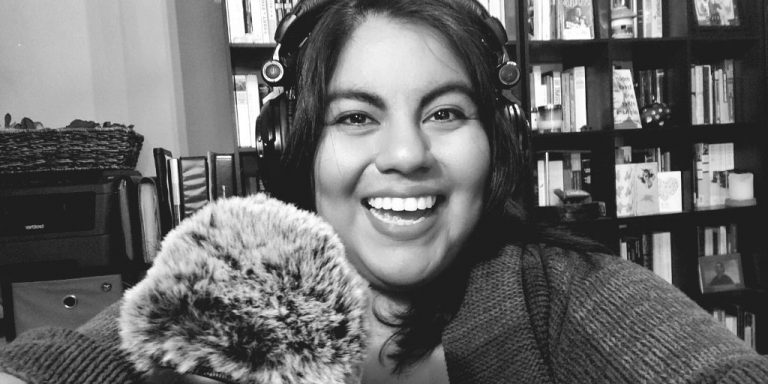
If you liked this interview, be sure to give us a like and a follow. Check out more interviews from this series.
Subscribe to The Social Academic blog.
The form above subscribes you to new posts published on The Social Academic blog.
Want emails from Jennifer about building your online presence? Subscribe to her email list.
Looking for the podcast? Subscribe on Spotify.
Prefer to watch videos? Subscribe on YouTube.
Bio
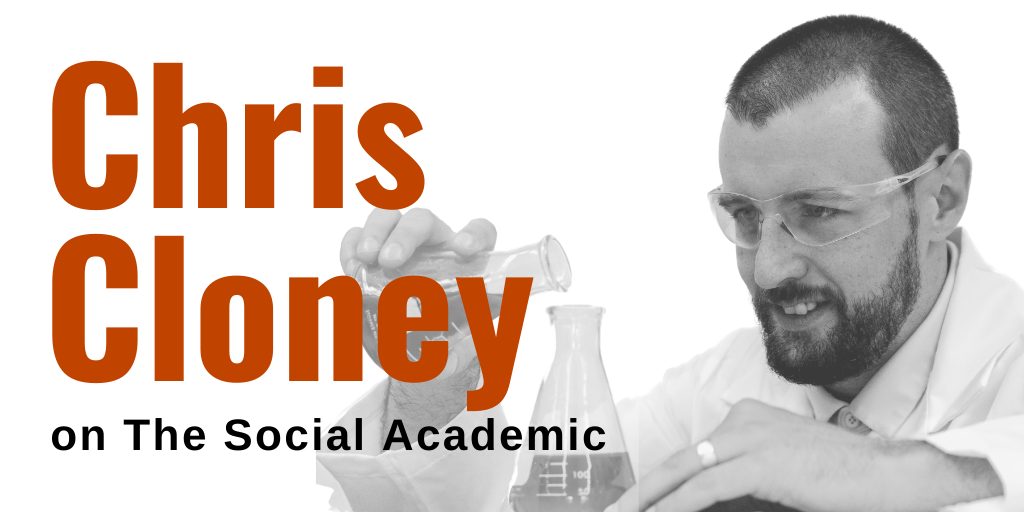
Dr. Chris Cloney is a recent (April 2018) PhD graduate in Chemical Engineering. He started blogging in the field of Industrial Safety and Dust Explosion Prevention & Protection in late 2016. In mid-2017 he started monetizing his blog and in mid-2018 he incorporated an independent research company at DustSafetyScience.com with the goal of achieving zero deaths from industrial dust explosions worldwide.
Through DustSafetyScience, Chris provides awareness and educational material through online channels, connects industries with safety service and equipment providers, and advocates change at industry-wide and government-wide levels around the world.
Chris originally created the GradBlogger podcast to share his journey of becoming self-tenured, becoming an authority in his field, and building an online business. Through GradBlogger Chris helps PhDs build profitable businesses through blogging, podcasting, and video so that they can be truly independent in their career, lifestyle and research directions. The mission of GradBlogger is to help 1000 academics each change 1000 people’s lives through online business.
Jennifer van Alstyne View All →
Jennifer van Alstyne is a Peruvian-American poet and communications consultant. She founded The Academic Designer LLC to help professors build a strong online presence for their research, teaching, and leadership. Jennifer’s goal is to help people feel confident sharing their work with the world.
Jennifer’s personal website
https://jennifervanalstyne
The Academic Designer LLC
https://theacademicdesigner.com
